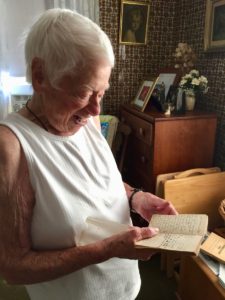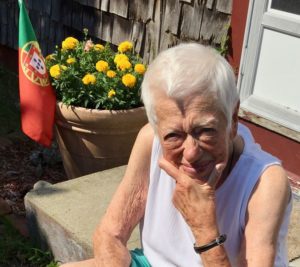
PROVINCETOWN — Bartender, bullet maker, bookkeeper — Beata Cook has been all these things. Not necessarily in that order. But who cares about chronology when you’re listening to a master raconteur?
It’s a hot Sunday afternoon in late July, and Cook, dressed in shorts and a white tank top that matches her close-cropped hair, has shut the screen door, turned down the volume on the TV, and eased herself into a chair in the small square living room of her house on Pleasant Street. Propped on a shelf to her right is a black-and-white photograph of Cook and her family — sisters Marian and Sarah, brothers Paul and John Jr., mother Nellie, and grandmother Sadie, a.k.a. “Nanny” — taken 75 years ago. To her left is the door to her bedroom, where she keeps Nanny’s diaries. And beyond the far wall of the bedroom is a bend in the road that leads to the neighborhood she grew up in, a short walk from here, where Franklin Street meets Tremont.
We are sitting in the West End of Provincetown of 2019, but as Cook talks about her childhood we can easily picture ourselves in the West End of 1931 or ’32 — scurrying down Mechanic Street to Manuel Furtado’s boatyard and playing on the harborfront. There are rusty cans and shards of glass littering the sand. There are children swimming in the water, held up by homemade floaties built of rope and knobs of cork. There is a feast being prepared at Nanny’s house up at the top of Tremont Street — a Sunday roast, the traditional sequel to the Saturday night Cook family supper of hot dogs and beans.
It’s a Provincetown that doesn’t exist anymore. Cook’s gift is bringing it to life.
“There wasn’t a whole lot of conflict,” she says of that carefree time. “We didn’t have any money, but we had gardens to grow vegetables in and the fishing fleet was in full force back then. You could always go down to the pier and get a bucket of fish.” The West Enders kept to their part of town and the East Enders stayed in their neighborhood, but these divisions were only geographical — in most ways, the town was united.
“Pert and affable” is how the Provincetown Advocate described Cook in 1954 when she was working as a waitress at the Old Colony Tap — and the adjectives still apply. At 95, she’s cheerful and gregarious, with a memory that’s sharp and teeming as a fish trap on a dropping tide. She can sift through the years and pull up a description of the hot-chocolate-sauce-drizzled yellow cake her grandmother used to make, or the colorful clientele at Waterfront Mary’s in Webster, where she worked for a while as a bartender, as readily as she can tell you about the cocktail she had the other night.
It’s a skill that puts her in a line of distinguished Provincetown storytellers — the kind admired by Mary Heaton Vorse in her classic book Time and the Town. Vorse would sit in front of a campfire with Captain Ambrose Cook of the Peaked Hill Bars Life-Saving Station and listen to his tales of wrecks and rescues. She would copy out the logs of whaling captain Kibbe Cook, rich with accounts of storms, mutinies, and boats stove by whales on voyages to the South Seas and the Arctic Circle. (Neither of those Cooks was related to Beata.)
Audiences listen to Beata Cook with the same rapt attention. About eight years ago Cook started writing her memories down at the encouragement of poet Hilde Oleson, who led a writing group at the Council on Aging. Cook took her jottings to the microphone at the Writers Voice Café, upstairs at Napi’s restaurant, drawing laughter with her anecdotes of life at her grandmother’s house in the 1930s — including one involving a sleep-deprived Dr. Daniel Hiebert.
“One night, late,” she says, “my grandmother began feeling very unwell, with an uncomfortable feeling in her chest and some dizziness. So she called Dr. Hiebert. He arrived shortly afterwards, removed his Stetson hat, and plunked down beside her on the couch. He asked her a few questions, then foregoing the use of his stethoscope, he rested his head on her ample bosom to listen to her heartbeat and promptly fell asleep. Nanny allowed him to rest in this position for about 10 minutes, then she gently poked Dr. Hiebert and said, ‘Dr. Hiebert, you have to get off my titties and go home now.’ All was well. He got a much-needed nap, and she got through the night just fine.”
In July 2018 Cook stole the show in the back room at the Crown & Anchor, regaling the crowd with ribald tales of being young and gay in Provincetown in the World War II years and after. The occasion was a reading produced by the Generations Project, a New York City-based nonprofit that preserves LGBTQ history through intergenerational storytelling.

Wesley Enos, director of the Generations Project, invited Cook to participate in the storytelling event after hearing about the “wonderful spitfire of a lady” who lived at the end of Pleasant Street.
“Beata is the Portuguese grandma figure I wish I had always had,” Enos says by e-mail. “She is sharp, full of life, and makes me laugh out loud. I visit her and will just sit on the floor in front of her as she tells me stories about being gay in Provincetown in the ’40s and ’50s.”
An open and accepting town
Cook speaks matter-of-factly about that time in her life, which began when she left town to study at Bridgewater Teachers College.
“My first girlfriend was a girl I met in college,” says Cook, who brought Peggy, her new flame, home for the summer after their first year at school. “She stayed at my house and we got a job cutting fish down at the fish pier — it’s a pretty damn smelly job, let me tell you. I hadn’t openly come out to my parents, but they eventually knew, I think, without too much surprise.”
When summer was over Cook and her girlfriend moved to Northampton, where Cook took up work making machine-gun bullets in a nearby military ordnance plant. World War II had begun, and there was economic opportunity to be found off-Cape.
“I was young and I was strong and I was adventurous, and I wanted to do things that were a little different,” Cook says. “I liked finding new things and meeting new people.”
After Cook broke up with Peggy she moved to the suburbs of Connecticut to work alongside her parents, who had left Provincetown for a job at a Pratt & Whitney aircraft factory in Plainville. Then it was on to Detroit for another stint at an ordnance plant, and after that, Manhattan, where Cook and her roommates paid $25 a week for an apartment “a stone’s throw from Central Park West.”
It was a wild time. By day she worked odd jobs, like doing paperwork for Electrolux. “At night I’d go down to the Village and drink up a storm. I was a hard partier. That’s why I’ve lasted to 95. I’m pickled.”
Cook’s gallivanting with the girls never seemed to ruffle her Portuguese family. Back in Provincetown, “I never had any problem. They knew me, and I wasn’t running around with a crowd and carrying on. I just came down with the girls and they accepted it as such.”
She credits that sense of freedom to Provincetown’s live-and-let-live atmosphere, an open and tolerant attitude that extended not just across the gay-straight border but the whole social and economic spectrum.
When she worked as a cocktail waitress at the Old Colony in the ’50s, Cook says, “You had all these Bohemians coming in, all these writers. They were so poor they didn’t have a pot to piss in. The fishermen would come in from a decent trip and buy ’em a bunch of beers. Everybody mixed in those days.”
Carrying on Nanny’s tradition
Cook will go on writing and telling her stories as long as she can, she says — and there is much more to tell. In 2014 a piece she wrote for the Portuguese Festival booklet caught the eye of former Provincetown Banner editor Sally Rose, who invited Cook to contribute a column to the paper. It’s called “This, That & the Other,” and it keeps Cook stirring through her past for inspiration — from those early days in the West End to the frolicsome ’60s and ’70s, when she worked as a bookkeeper at the old Town House and a bartender at the Post Office Café.
Not that Cook has to rely solely on the past. Her present is full, with a part-time job working in the booth up at the Grace Hall parking lot and a growing circle of admirers, like Wes Enos and his friends, to keep her social schedule lively — and give her plenty of material to draw from.
If there is a source that she could trace it all back to — her desire to write stuff down and make a story of it — she points to a stash of small bound journals, blotchy with fountain-pen ink, that hold the daily jottings of her beloved grandmother. Nanny, as she writes in one of her columns, “was a hard-working, generous, warm and loving Yankee who could cuss with the best of the salty old fishermen should the occasion arise.”
She might also have been a frustrated writer, Cook says, gazing fondly down at the pages scrawled in Nanny’s hand. “She’d write every thought she had.”
Bartender, bullet-maker, author? For now, Cook is just enjoying doing what writing she can — starting with a “germ of an idea” and growing from there, not fussing or trying to make anything too perfect.
“I write because I like to write,” she says.
The record of Provincetown history is richer for it.



